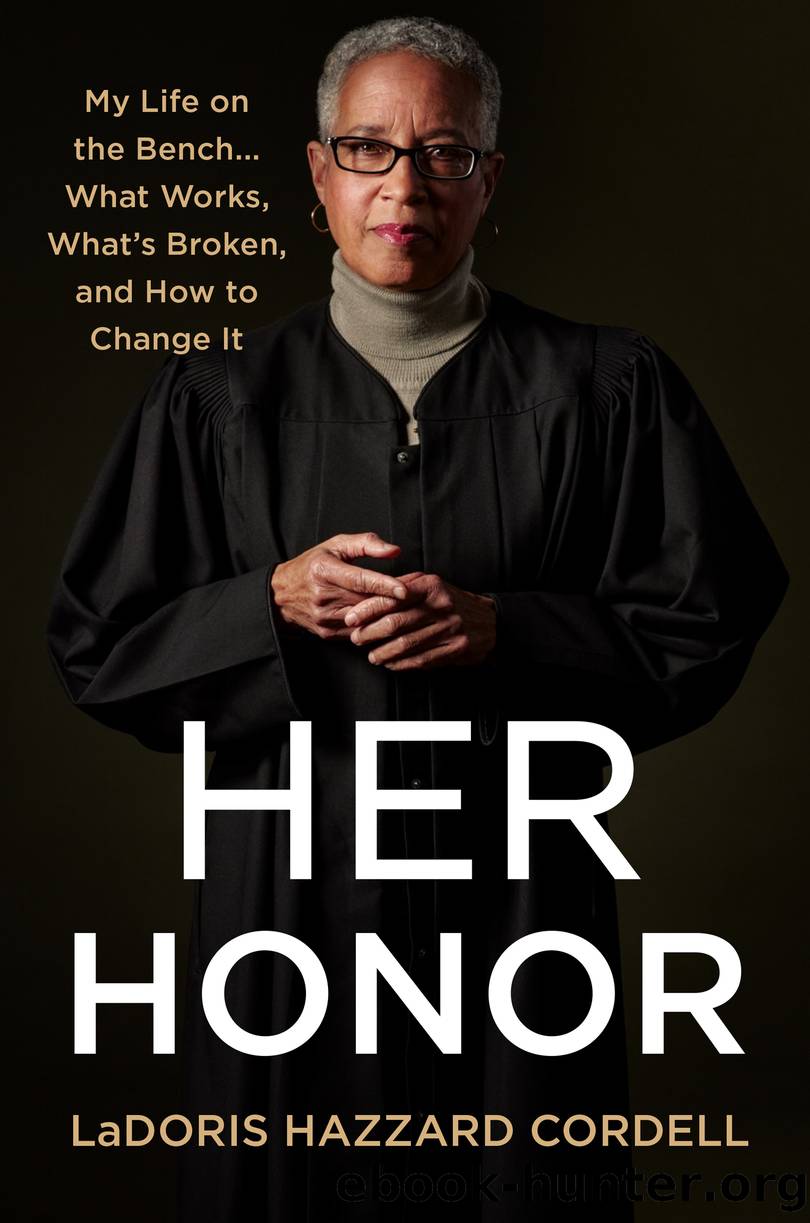Her Honor by LaDoris Hazzard Cordell

Author:LaDoris Hazzard Cordell
Language: eng
Format: epub
Publisher: Celadon Books
If a judge cannot publicly comment while her case is pending, when is it no longer pending? It depends. If an appeal has been filed after a judge has ruled, the case is pending until the appellate courts have finally ruled, which could be weeks, months, and sometimes years down the road. In a criminal case, even when there is no appeal, it is still pending as long as the defendant is on probation; a probation violation would land him in court to again face the judge who sentenced him. Because of Californiaâs Canon 3B (9) prohibition on public comment, Judge Persky was muzzled; he was unable to explain to the public the underpinnings of his decisions in each of the cases singled out by the recall campaign because they were all âpendingâ cases. If he were to speak out, he would be in violation of the canonâfor which he would almost certainly be disciplined, with removal from the bench a possibility.
When an accused person remains silent in the face of accusations, suspicions abound, especially, as in this case, when the recall campaign portrays the judgeâs silence as evidence that the allegations against him must be trueâif he doesnât have anything to hide, he would defend himself. Unaware that judges are prohibited from making public comments about their cases, Santa Clara County voters were understandably distrustful of Judge Persky. What kind of man is this who has to rely on surrogates to speak for him? I was the most vocal of the judgeâs surrogates. When I explained that the California Code of Judicial Ethics did not permit Judge Persky to rebut the recall campaignâs false allegations, and when I spoke of the importance of respect for the independence of the judiciary, my words fell on deaf ears. At public debates, when I described in detail the facts of each of the cases so distorted by the recallers, and after I recited the rules that Judge Persky had lawfully applied in each case, I received a chilly response. And when I spoke about the sanctity of judicial independence and why the recall threatened that independence, the reception was even chillier. The repeated derision of the very idea of an independent judiciary by the recall campaignâs spokespersons, two Stanford law professors, didnât help.
It is one thing to recall a judge for an act of malfeasance; but it is quite another thing to recall a judge for making a lawful decision that we donât like. Think about it. Judges take an oath to defend and to bear true faith and allegiance to the Constitution. But today, a judge can lose her job if, in defending the Constitution and bearing true faith and allegiance to it, she renders a decision that happens to be controversial. Putting the judicial finger to the wind to gauge public opinion is fast becoming the standard for judicial decision-making. And when that happens, when the cacophony of the mob determines how judges decide their cases, our independent judiciary becomes our dependent judiciary.
Download
This site does not store any files on its server. We only index and link to content provided by other sites. Please contact the content providers to delete copyright contents if any and email us, we'll remove relevant links or contents immediately.
Machine Learning at Scale with H2O by Gregory Keys | David Whiting(4291)
Never by Ken Follett(3935)
Harry Potter and the Goblet Of Fire by J.K. Rowling(3845)
Unfinished: A Memoir by Priyanka Chopra Jonas(3378)
Fairy Tale by Stephen King(3368)
The Man Who Died Twice by Richard Osman(3070)
Will by Will Smith(2906)
Rationality by Steven Pinker(2349)
It Starts With Us (It Ends with Us #2) by Colleen Hoover(2337)
Can't Hurt Me: Master Your Mind and Defy the Odds - Clean Edition by David Goggins(2319)
The Dark Hours by Michael Connelly(2299)
The Storyteller by Dave Grohl(2226)
Friends, Lovers, and the Big Terrible Thing by Matthew Perry(2218)
The Becoming by Nora Roberts(2188)
The Dawn of Everything: A New History of Humanity by David Graeber & David Wengrow(2187)
The Stranger in the Lifeboat by Mitch Albom(2111)
Cloud Cuckoo Land by Anthony Doerr(2098)
Love on the Brain by Ali Hazelwood(2059)
Einstein: His Life and Universe by Walter Isaacson(2008)
